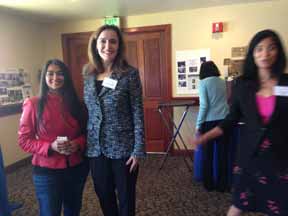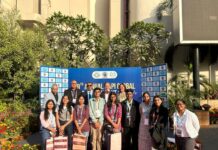 SAN JOSE: A mid- sized room in the San Jose Airport Garden Hotel was abuzz with activity and excitement, and the energy of the hundred or so women was palpable. It was not a tea party, a tupperware party, or a book club discussion. It was evident from the smartly dressed women congregation that this was all business. The annual career and mentoring conference by IBPW (Indian Business and Professional Women) in Silicon Valley, was about to begin!
SAN JOSE: A mid- sized room in the San Jose Airport Garden Hotel was abuzz with activity and excitement, and the energy of the hundred or so women was palpable. It was not a tea party, a tupperware party, or a book club discussion. It was evident from the smartly dressed women congregation that this was all business. The annual career and mentoring conference by IBPW (Indian Business and Professional Women) in Silicon Valley, was about to begin!
This afternoon, experts on topics such as building a personal brand, mastering the art of leadership and communication, and navigating the social media shared their expertise and wisdom.
Keynote speakers, moderators and panelists spanned careers in engineering, business development, sales and marketing, psychiatry and evangelism, with titles ranging from CEO, VP, Senior VP, President, Founder, and M.D! With such credentials and experience, it promised to be an informative and educational afternoon, with networking opportunities over refreshments later.
The afternoon began with the Keynote speaker, Ana Pinczuk of Cisco, who brought years of personal branding experience and insights to emphasize the value of leveraging a personal brand to move to the next step in the career ladder. Elaborating on the concept, she shared that the three most important things about your brand are: to know who you are, how you are perceived, and to ignite your brand.
Branding, or making yourself known to others can be powerful and enduring growth enhancers if you can suitably bridge the gap between the view of self and the aspired goal. Ana concluded that this can come with aligning your brand with market needs and positioning of self with demonstrations of required capabilities while maintaining an honest view of one’s strengths and weaknesses.
The first of three panels, moderated by Alka Jarvis was dedicated to mastering the art of impactful communication, led by Cisco executives, Afsaneh Laidlaw and Manjula Talreja. The takeaway lessons centered on creating an aura of your personal brand, for which communication is the best armor. They urged rehearsing the first three minutes of an elevator pitch, with a “hook” designed to convince the audience of the value proposition.
Trends in communication were also discussed, which include multiple modalities, in addition to face to face conversations, such as power point, blogging and other social media avenues.
A second panel consisting of McAfee (an Intel company) executive Sajeen Warrier, and Garima Thockchom from Akasia, was a lively discussion focused on leadership, moderated by Monica Kumar from Oracle.
A “mythbusting” format began with debunking the first myth that” Female leaders have to emulate successful male counterparts”. The fact being that a large majority of examples are males, it was suggested to look for qualities to emulate in leaders regardless of gender, and link it back to the path in your own leadership journey.
An interesting observation was that compassion in leadership, that women tend to bring more, and how that opens door for them and elevates the nature of leadership.
The next myth explored was “Are leaders born”? A split in the viewpoints of the two panelists revealed that while Garima maintained a leader is a combination of natural abilities and training to hone those skills, Sajeena was of the opinion that a spectrum of leadership skills and strategies can be nurtured and trained. With feedback to recognize your blind spots, one can identify and attend to competencies, as well as seek, demand, and get offered the resources to bridge any deltas in those competencies. Leaders often get trained and naturalize these qualities.
The third myth addressed if “it is your title that makes you a leader”? The panelists expounded that within the personal brand, credibility, track record, and your interpretation of duties and responsibilities seem to hold weight.
Your title does not have to be limiting, as you can use your job to make it what you want, showing curiosity about other aspects outside of defined job descriptions.
Projecting confidence and changing mindsets would allow careers to be played like a game with intelligent moves and strategy. Sajeena recommended some reading (see note), and actively seeking advisors to get support from both sexes in your success.
The last panel, moderated by Shubhangi Vaidya focused on lessons learned from social marketing, an unfiltered, often convoluted, labyrinth interfacing personal and professional lives.
Reshma Nigam, of aMarketForce shared her journey from a journalist to social media and managing marketing solutions for B2B (Business to Business), and Soumya Ravi, of eBay emphasized the value of marketing what you can measure and create.
The relevance of including a psychiatrist in this panel was not entirely obvious, however, Maya Sastry spoke of integrating needs of the mind and body in functional medicine. Jill Crowley, who calls herself the Chief Evangelist of her personal brand, talked about changing mind sets as well as skill sets. In all, the panelists agreed that social media can be used to showcase expertise, participate in social communities, highlight content knowledge, and create and foster a circle of influence based on trust.
The audience members were by now suitably engaged and welcomed the opportunity to share their own thoughts and ideas armed with plates of healthy refreshments. The energy of the room shifted to a more interactive level, and animated discussions were evident at every table.
Overheard snippets suggested topics discussed included male dominance in corporate world, chauvinism, inability to deal with female authority by both men and women, abuse and derision of female employees by males, income disparity etc.
This forum allowed a platform for frank discussions and courageous conversations. All the women participants, regardless of their title, achievements or career paths shared an afternoon of camaraderie and support, and left with renewing old relationships, or having made some new ones.
Similar discussions have flowered from the work of other leaders such as Sheryl Sandberg, Elizabeth Warren, Michelle Obama and Hillary Clinton, powerful and influential women in politics and corporations.
Against the backdrop of such optimistic bonhomie, I would like the readers to ask the questions “How does architecting your career compare to reinventing yourself?” and “What role does luck, or being in the right place at the right time have to do with your actual success?” It requires more introspection on the part of the women on how they can navigate in their careers, and merits diverse ways of exploring it, without being bound by any particular model of feminine advancement.
Book titles:
“Hit the ground running: by Liz Cornish
“Ask for it” Linda Babcock and Sara Laschever
“Nice girls don’t get the corner office 101 (Unconscious mistakes women make that sabotage their careers” by Lois P. Frankel, Ph.D
Archana Asthana






